DISCUSSION WITH RADIO HOST ON: ARNOLD AUGUST’S TWO BOOKS, CUBANÍA, SOVEREIGNTY IN HANDS OF PEOPLE AND PARTICIPATORY DEMOCRACY (CUBA, VENEZUELA, U.S.), CUBA AND AFRICA, CUBA’S MEDICAL INTERNATIONALISM, KATRINA AND HURRICANES IN CUBA, THE U.S. BLOCKADE RELATED TO THE IFCO PASTORS FOR PEACE CUBA CARAVAN, THE CUBAN FIVE, AND LASTLY THE SO-CALLED “LEFT” DISSIDENTS
Click here to see the book cover.
The following is a complete transcript, with minimal editing for clarity.
To go back to the Videos, Interviews and Photos page, Click Here.

- Arnold August Radio Interview and Discussion at WJFP 107.1 FM, WJFP.com, Fort Pierce, Florida, Reality News Radio – Radio Cubanía.
- Host: Wil Van Natta. June 17, 2013
 Wil Van Natta: Good afternoon, South Florida, and welcome to the Interreligious Foundation for Community Organization (IFCO) Pastors for Peace and Reality News Radio – Radio Cubanía, putting all things Cuban on the agenda. My name is Wil Van Natta, coming to you from WJFP 107.1 FM, Fort Pierce, Florida, live streaming at WJFP.com. Today is the third in our Monday series in June of putting things Cuban on the agenda, Radio Cubanía, and today we have with us author and lecturer Arnold August. […] First of all, welcome, Arnold. Thanks for coming on the show today.
Wil Van Natta: Good afternoon, South Florida, and welcome to the Interreligious Foundation for Community Organization (IFCO) Pastors for Peace and Reality News Radio – Radio Cubanía, putting all things Cuban on the agenda. My name is Wil Van Natta, coming to you from WJFP 107.1 FM, Fort Pierce, Florida, live streaming at WJFP.com. Today is the third in our Monday series in June of putting things Cuban on the agenda, Radio Cubanía, and today we have with us author and lecturer Arnold August. […] First of all, welcome, Arnold. Thanks for coming on the show today.
Arnold August: Thank you for inviting me.
WVN: Arnold August has an M.A. in Political Science from McGill University. He’s an author, journalist and lecturer living in Montreal. He’s the author of Democracy in Cuba and the 1997–98 Elections. He’s also contributed a chapter entitled “Socialism and Elections” for the volume Cuban Socialism in a New Century: Adversity, Survival and Renewal, published by University Press of Florida. His current book, and what we will be speaking about mostly today, is entitled Cuba and Its Neighbours: Democracy in Motion. And it soon will be published in Spanish and French. And again, welcome, Arnold, to Radio Cubanía.
AA: Thank you.
WVN: Okay. Let’s get started here. First of all, why, after writing – gosh, it’s been over a decade ago now since Democracy in Cuba and the 1997–98 Elections – why a book on Cuba and its neighbours and democracy in motion? Why that subject? At this point in time?
AA: There are several reasons, Wil. Firstly, in my first book – I think you had a chance to read it a long time ago – that book, as the title indicates, Democracy in Cuba in the 1997–98 Elections, deals essentially and almost uniquely with the elections in Cuba, the electoral system in Cuba, but, of course, giving the historical background based on the 19th - century experience. And it’s pretty much based on the name that your show, Cubanía, suggests – that is, putting Cuban things on the agenda. Aside from the historical context, the elections were the only aspect that I dealt with. Now, for the second book – Cuba and Its Neighbours – published in January 2013, I worked on it since 2007. It deals with much more than the issue of elections in Cuba. Firstly, regarding Cuba, I deal with the elections, but it’s much more updated. In fact, I’m having comments coming in from Cubans and non-Cubans alike, specialists in the field, who are saying – you know, I am a bit shy to say so – but they are basically saying that this is the best book on the issue of the electoral system in Cuba. That is, the book illustrates how it operates and it brings the readers right into the electoral system. At the same time, it is not apologetic. It quotes different social scientists, political actors in Cuba who have things to say with regard to the necessity of improving the electoral system. This part – the balanced part, the critical part, if you like – I did not have in the first book. Secondly, with regard to Cuba – which I did not have in my first book – is, once elected, okay, fine, but how do the different levels of the state operate between elections? Whether it is at the national level, municipal level and even the grass-roots level below the municipal level, how do they function? What do they do? What is the role of the people in these institutions? And so, this is entirely new. Now, the other theme that is entirely new is revealed by the title of my book – Cuba and Its Neighbours: Democracy in Motion. What I’ve tried to do is to open up horizons for people from all walks of life, from different political orientations in all countries, whether it’s the United States, Canada, Britain or in Latin America, with regard to the concept of democracy.
As you know, Wil, you’ve been in this for a long time, the issue of democracy is a very loaded term. It’s a very controversial term; there’s a lot of confusion about it. Therefore, I start with the notion of democracy as such, and then, in order to open up the horizons or the viewpoint with regard to democracy in Cuba, I deal with Cuba’s neighbours. Now, which neighbours did I choose? The first neighbour that I chose is the United States of America. Chapter 2 of my book is actually called “Democracy in the U.S.” It’s entirely dedicated to how democracy and elections function in the United States. And then, in the next chapter, I deal with three of Cuba’s other neighbours, which, of course, manifest quite different political systems compared with the United States. These three neighbours are Venezuela, Bolivia and Ecuador. So, in this first part of the book, by comparing different types of democracy and by analyzing my notion of democracy, I conclude that democracy has to be a participatory democracy, which is essentially the guiding point on democracy. Otherwise, democracy does not make sense. Seeing as it has to be, in my view, a participatory democracy, participation necessarily means “an ongoing movement” – an ongoing motion of developing participation of the people. Now, the last country dealt with is Cuba, which takes up a little less than half of the book. Thus, to further answer your question, according to the reviews coming in from different countries and specialists, it’s entirely new. It consists of a new background, making these comparisons in order to bring out the concept of democracy so that it is looked upon, especially with regard to the Third World. People have to drop the old engrained notions of what democracy should look like in the Third World. Therefore, this is also what makes my book far different from my previous publication. I have to say, judging from what other people have said and not me alone, it is quite unique in a lot of ways with regard to how the different countries are compared concerning their respective political systems.
WVN: Right, and you know, I’ve read your book and I must admit even though I love the subject, I was really pleasantly surprised even beyond what I thought I was going to be. I want to say, also about Arnold August, is that I know that, in your first book, you were the only non-Cuban to have witnessed the entire electoral process in Cuba at that time. Is that not right, Mr. August?
AA: Yes, it is true to a certain extent. Actually, at that time, there was one other person, an American author and academic, who also witnessed a great deal of the steps in the electoral system. But, with regard to my current book, the 2007–2008 elections, I am the only person who really attended all the steps of the electoral process in order to update it as well as attended all of the important functions of the state between elections. For example, at the grass-roots level – the People’s Council – I attended sessions of the People’s Council, which is a local grass-roots organization within each municipality. It is very small; we’re talking about only 15 or 20 elected delegates. I am the only non-Cuban to have attended the permanent working commissions’ sessions of the Cuban parliament, which are very important. You don’t hear very much about the working commissions of the Cuban parliament. It’s the key because these working commissions – there are 12 of them – they work continuously day and night virtually throughout the 12 months in order to work on the legislation and present the proposals for new laws. I was able to attend those as well, and I bring this experience into my book in a lively way. I say so because this is the reaction that I have been receiving from many people. I have to emphasize, Wil, I did over 30 interviews with people at different levels, from the grass roots to deputies of the national parliament, in order to render the Cuban political system so that readers feel that they are living through it. In this way, readers can get a grasp of the political system in Cuba, its elections and how the state operates between elections at all levels.
WVN: Right.
AA: Excuse me. Were you going to ask me a question?
WVN: Well, I was just going to say that, you know, most folks who are listening are probably saying, “Why are you talking about democracy in Cuba? I mean, here in the United States, we vote all the time and yet we hear there is only one party in Cuba. How could there possibly be a democracy there?” I mean, I think we really need to flesh that out a little bit. Can you talk about the lack of money in the elections in Cuba, whereas, in our system here, it was just reported that the Democratic Party advises their members of Congress to spend time raising money, four to six hours per day. Last year, Obama went to 220 fundraisers. So, what’s going on in Cuba… like, say myself, I live on North Palm Beach, Florida. What would be my role in North Palm Beach, Florida, or in Fort Pierce, Florida, as a citizen?
AA: I think your question is very valuable and one does not have to be defensive about asking that question with regard to Cuba and democracy; there is only one party and all that. I have to be frank with you. I just initiated a new series of book launches in the United States and Canada and that question comes up quite a bit. Thus, my basic take on that issue of parties is the following, Wil. Firstly, my premise is the number of parties in a political system, say this so-called “one party system” versus the so-called “multi-party” or “two-party system,” I believe this is a false dichotomy. People have to escape from that trap, of thinking within those confines. Instead, I propose the following: the dichotomy, the distinction should be, on one hand, between political systems of any kind which foster sovereignty being held in the hands of the people – that is, the actual, real and effective participation of the people in the political affairs of their country. On the other hand, political systems that are based on exclusion are the opposite of fostering sovereignty being held in the hands of the people. Therefore, if we look at it this way, the issue is not whether there is one party in Cuba or more than one party in Cuba; the issue is that Cuba, since the Revolution, is a political system that fosters people fully participating in the affairs of the state.
Now, I have another example in my book, Venezuela. Venezuela, of course, has many parties, but the only party that really fosters sovereignty being held in the hands of the people, that really encourages definite, concrete participation of the people in the daily functioning of the state and in their own lives is the party that is linked to the Bolivarian Revolution – the Chavista party. However, let’s say – and I gave this example in a Left Forum panel that took place just about a week ago at Pace University in New York – what would happen, for example, if the Chavista party loses the next election or, for example, is overthrown by a U.S. coup d’état – which is always possible. In these cases then, this multi-party system is converted into a dictatorship of the Venezuelan and U.S. oligarchies against the vast majority of the people. So, you see, Wil, I think that this false dichotomy between so-called “single” versus so-called “multi-party system” does not hold water. (For a YouTube presentation of this conference in New York, click here)
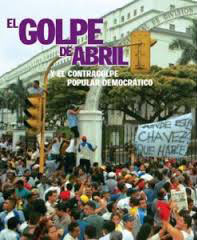
2002 US-supported
coup in Venezuela
defeated by
people’s democracy
WVN: Right. You mentioned coup d’états. You know and, of course, we know, there was an attempt to overthrow Chávez in 2002 as Zelaya was in Honduras and Allende was on September 11, 1973. But, you know, you mentioned coup d’états and it reminds me of the quip that is heard around Latin America and that is: why is there never a coup d’état in Washington, D.C.? Because there isn’t a Washington embassy (laughing).
AA: There is a lot of truth to that, and I’ll add one more date to your list of coups d’état. The latest attempt by the U.S. with regard to a coup d’état was on April 15, 2013 in Venezuela, the day after the elections when Obama questioned the results. Then, of course, this encouraged the opposition to try to foster some kind of an incident in Caracas and all over the country.
WVN: And people were killed, people died as a result of that. Yes.
AA: Eleven people were assassinated by the pro-Obama forces in Venezuela. Their idea was to try to foster a situation of instability and allow for U.S. intervention in Venezuela and overthrow the system. This did not happen. Why? Because, in Venezuela, under the Bolivarian Revolution, despite all its defects – and I know it is not perfect – there is a revolutionary democracy there. It is important to notice that on April 15, not one member of the Venezuelan armed forces, not one soldier, not one officer, not one political leader defected under the pressure of the United States and their agent Capriles. They all stood firm against those provocations on April 15. As a result of that, the attempted coup d’état was foiled. They were not able to bring it about.
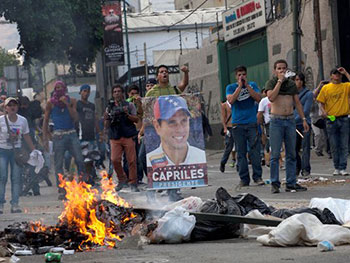
US-supported Capriles candidate
tries to provoke disturbances
Now, when we talk about participation in the United States, the opposite is the case. For example, I have in front of me here a document I always carry with me, this document is called “The Constitution of the United States.” The first sentence is “We, the people.” So, this whole myth is created that the Constitution of the United States is something popular, based on the people. However, in my book, Wil, I go into detail with regard to the origins of the United States, that is, the end of the 18th century when the Thirteen Colonies first came about. I show my point very clearly, everything I am saying with regard to the United States is very heavily documented.
WVN: Yes, it is. No conjecture in this.
AA: I use original documents – the Constitution, the primary source documents, what the Founding Fathers actually said… And you know, we don’t have time to go into it now, but the basic thing that I outline, I chronicle and I document is that, since the beginning at the end of the 18th century, the United States is based on exclusion. That is, from the beginning, the slaves were excluded and, of course, the native peoples were excluded – not only excluded but they were suppressed and slavery continued after the War of Independence or the so-called “Revolution.” The state and its Constitution that was established in the 18th century were based on exclusion. They still have the Constitution now, in the United States. When Obama travels around the world – when he arrives in France or other such countries – he says, “We, the United States, we have the oldest democratic constitution in the world.” Firstly, one part of that is right and one portion of that is wrong. When he says that we have the oldest democratic constitution in the world, the word “democratic” is not true. Because the word “democracy,” believe it or not, in this greatest democracy in the world, the word “democracy” is not at all to be found in the American Constitution. The modern term “sovereignty being vested in the hands of the people” is likewise not found in the Constitution of the United States. When the Constitution was adopted, the main orientation by the Founding Fathers and the oligarchy at the time was to exclude the people from participating in drafting that constitution. So, of course, Mr. Obama, you are right, it is a very old constitution. However, is it not time for the American people to have a new, modern constitution?
WVN: Well, you know, I just want to say that I think it is important for you to discuss, at this point, the nature of private property versus, you know, the rest of the world. You know, I would really like you to go into that.
AA: Okay, I know you know; you probably picked it up in my book. This is one of the issues that intrigued me for a long time, even though I researched it specifically since 2007. My investigation really goes back a long time, since my university days in the 1960s. Thus, the book is sort of a personal political testament. I have always been interested in the Eurocentric or now U.S.-centric view on the issue of politics, on the issue of constitutions. Now, the U.S. constitution is based on the following: for example, the word “liberalism” or “liberty” often comes up. This “liberty” or “liberalism” is often projected as a positive thing. Some people like to say “I am a liberal,” but what is the origin of liberty or liberalism in the context of the U.S. Constitution or in the context of U.S. history? It consists of the liberty to accumulate private property without any restriction – that is where liberty comes in. Of course, liberty was a step forward in comparison to the previous feudal system in Europe. However, with regard to modern times, the liberty to accumulate private property on an unlimited basis cannot be called something that is positive. And so, in the same Constitution of the United States, not only the American people, but the people of the world, are stuck with this notion, this second amendment, which was stated as the right to bear arms. You have this false – in my view – this false controversy going on between controlling arms or not controlling arms. However, my view is: is it not time to have a new constitution? And, this is where I agree with people such as Michael Parenti and others, and even status quo academics who are open-minded, saying that what the United States needs is a new constitution. The basis of the second amendment is not, you know, controlling one arm here, one arm there, a weapon here, a weapon there. We have to ask ourselves the following question: how come there is a society in the world, such as the United States, where there is complete freedom to have an unlimited arms industry for domestic and international utilization? That is a problem. And, along with this unlimited arms industry is the unlimited industry with regard to the fostering of violence as a culture, which is very profitable to the media, to television, to films. Thus, the issue is that there is a need for a new constitution. And, I have to say, when I finished the last draft of my book, in early December 2012, I was dealing with various incidents of shooting that were taking place on a regular basis in the United States, and this was before the more recent one – Newtown, Connecticut on December 14, 2012. However, I wrote at that time that the problem of shootings and violence is bound to come up once again. In fact, unfortunately, it did happen again – in that elementary school in Connecticut where the shooting took place. So, you know, I am not happy to say that I was right because a lot of people were killed. However, it goes to show that when you have a concrete analysis of something, you are able to foresee events as they are about to happen. In fact, shootings are still going on.
Therefore, the basic question is, for the United States, that the very nature of the system has to be questioned. It is not only a question for Americans, you know, I am a Canadian; it also affects people in France, in Italy. It very much affects people in the Third World, Cuba, Venezuela, Africa and Asia because it is this same domestic policy based on arms and violence that reflects itself in the external policy, in the foreign policy. For example, I deal in quite some detail about what it is called by the American press and Obama administration, as “abuse” by American soldiers, for example, in Iraq and Afghanistan. In other words, the killings that are carried out by the American military are not seen as part and parcel of a normal imperial policy to control other counties – these massacres that are carried out by the U.S. military are presented as exceptions to the rule that have to be sort of sorted out. Thus, there are some major problems in the American system – and the question: perhaps there is the need for a new constitution.
When I talk about participatory democracy in the United States, yes, there is participatory democracy in the United States, but it is not at the level of the leadership. It is not at the level of the White House. The White House, in fact, is against participatory democracy. There is participatory democracy at the grass-roots level, for example, the Occupy Wall Street movement, to a certain extent. I also, as you know, quote some of my favourite authors from among the Black Agenda Report, who clearly have a very courageous position against Obama. Because, as you know, there is a lot of pressure on the so-called “left” among liberals to refrain from criticizing Obama because he is an African-American – “We don’t want to rock the boat.” This has had a very negative effect among the African-American population in the United States. I say so because, in my view, the African-American population in the United States is really the standard-bearer – has been the standard-bearer – of what is progressive and revolutionary among the people at the grass-roots level, going back a long time.
WVN: Certainly, yeah. And you know what: I want to talk, in the second half of the hour, first of all, I want to talk about the usage – briefly – of the United States absconding with the term “America.” And then, I want to talk about Cuba and its relationship to Africa, and Africans in Cuba and that. What about the relationship between Cuba today, in recent history, and Africa, you know, with regard to Angola, South Africa… because I know that Nelson Mandela, when he was finally released from prison, the first person he thanked was Fidel Castro for his efforts in helping to liberate South Africa and other countries there. Can you talk about the relationship between the government of Cuba and – not only about the property relations there, but its relationships with not only the countries in Latin America, but also the countries in Africa and, indeed, of the world.
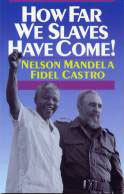 AA: Yes, of course. We just dealt very briefly with the United States being based on unlimited private property. Cuba, since the 1959 Revolution, is based on the opposite; it is based on solidarity, on a collective notion with regard to societyand, I would say, a collective notion with regard to international relations – a collective notion based on solidarity. As a result, it was only normal for Cuba, after the 1959 Revolution, when it was necessary – when Africa called, when Africa needed help to overthrow the Apartheid government supported by the U.S. Anglo-American alliance, Cuba answered that call and sent soldiers to Africa in order toassist the Africans to liberate themselves from Apartheid. What happened after this war was victorious against Apartheid and it was defeated? The Cuban soldiers came back home to Cuba. Those who weren’t killed there came back. This is entirely the oppositecompared with when the U.S. goes somewhere, even for so-called “disaster relief.”Theystay. They use every pretext to dominate other countries, while Cuba, based on anentirely different perception of history, a perception of values, if Cuba goes to other countries, whether it is Africa, it is to assist – to liberate and then comeback.
AA: Yes, of course. We just dealt very briefly with the United States being based on unlimited private property. Cuba, since the 1959 Revolution, is based on the opposite; it is based on solidarity, on a collective notion with regard to societyand, I would say, a collective notion with regard to international relations – a collective notion based on solidarity. As a result, it was only normal for Cuba, after the 1959 Revolution, when it was necessary – when Africa called, when Africa needed help to overthrow the Apartheid government supported by the U.S. Anglo-American alliance, Cuba answered that call and sent soldiers to Africa in order toassist the Africans to liberate themselves from Apartheid. What happened after this war was victorious against Apartheid and it was defeated? The Cuban soldiers came back home to Cuba. Those who weren’t killed there came back. This is entirely the oppositecompared with when the U.S. goes somewhere, even for so-called “disaster relief.”Theystay. They use every pretext to dominate other countries, while Cuba, based on anentirely different perception of history, a perception of values, if Cuba goes to other countries, whether it is Africa, it is to assist – to liberate and then comeback.
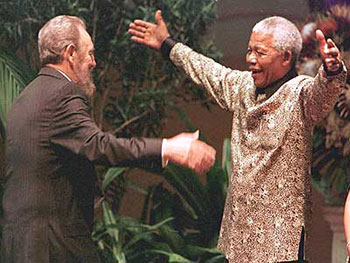 In the current situation, Cuba has further internationalized their new system based on solidarity by having literally tens of thousands of doctors going to every corner of the world, whether it is Latin America, Africa and Asia to assist people with regard to health, to train health professionals from these countries to deal with their own people. This is really something entirely new. Here, in the U.S., the government adopted a special law that actually encourages the Cuban doctors to defect in other countries, whether it is in Venezuela, Bolivia or Africa. The U.S. has a special sort of a “prize”: “If you defect, we will give you a visa automatically. We’ll set you up.” Nevertheless, you know, Wil, with all of these attempts to get doctors to defect, according to the latest statistics, approximately not more than one or two percent of the Cuban doctors sent overseas actually buy into the call to defect by the United States. So, even on this front, the United States has failed with regard to the Cuban’s notion of solidarity, bringing help to other people.
In the current situation, Cuba has further internationalized their new system based on solidarity by having literally tens of thousands of doctors going to every corner of the world, whether it is Latin America, Africa and Asia to assist people with regard to health, to train health professionals from these countries to deal with their own people. This is really something entirely new. Here, in the U.S., the government adopted a special law that actually encourages the Cuban doctors to defect in other countries, whether it is in Venezuela, Bolivia or Africa. The U.S. has a special sort of a “prize”: “If you defect, we will give you a visa automatically. We’ll set you up.” Nevertheless, you know, Wil, with all of these attempts to get doctors to defect, according to the latest statistics, approximately not more than one or two percent of the Cuban doctors sent overseas actually buy into the call to defect by the United States. So, even on this front, the United States has failed with regard to the Cuban’s notion of solidarity, bringing help to other people.
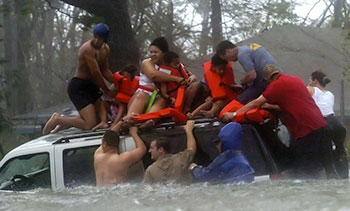
New Orleans: Hurricane Katrina
WVN: Well, you know, I just want to jump in and say, you know, the irony is so thick on this because, during the debacle – the absolute horrendous disaster – of Hurricane Katrina on Black New Orleans, you know, Vice-President Dick Cheney – when the Cuban government offered to send doctors there to assist those suffering people as they lay, as they were in the stadium there, you know, our Vice-President said, “We don’t accept help from Cuban – from communist – doctors” and yet, here we are, trying to get the communist doctors to leave – to come over to the United States.
There are a couple of other things about that I want to say also, you know, we’re doing this in support of the IFCO Pastors for Peace Cuba Caravan, and I want to mention to please contact cucaravan@igc.org or realitynewsradio@gmail.com if you’d like to come along on the Cuban Caravan this year.
 And not only that, but talking about doctors in Cuba and travelling to Cuba and back and forth, there’s also the Cuban medical school, which trains underprivileged people in the United States and elsewhere in the world for free – to become a doctor for free in Cuba. This is something that’s just unheard of in the United States. Students in the United States here are wallowing in lifelong debt for going to college. Cuba is offering a medical school for free – even to people from the United States. But, anyway! I am sorry. Go on.
And not only that, but talking about doctors in Cuba and travelling to Cuba and back and forth, there’s also the Cuban medical school, which trains underprivileged people in the United States and elsewhere in the world for free – to become a doctor for free in Cuba. This is something that’s just unheard of in the United States. Students in the United States here are wallowing in lifelong debt for going to college. Cuba is offering a medical school for free – even to people from the United States. But, anyway! I am sorry. Go on.
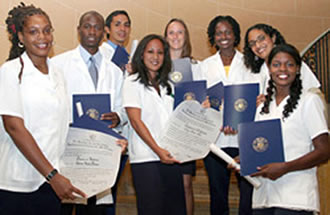
8 U.S. ELAM graduate students
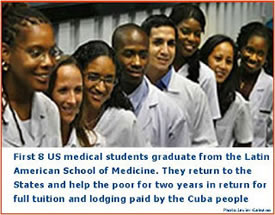
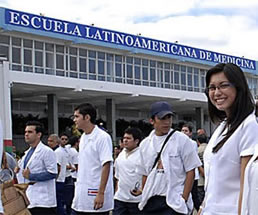
AA: Now, I think your point is very well taken with regard to Katrina; it is true. I mean, you had that reaction by the White House to refuse Cuban help in Katrina. Later on, the mayor at the time of New Orleans, Ray Nagin, he was invited and went to visit Cuba in order to learn about their system with regard to avoiding damage during hurricanes. He actually made a statement saying that the Cuban system is far superior than the American system.
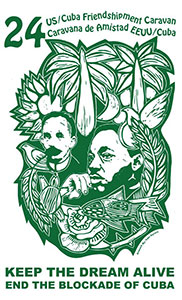 Of course, this was pretty much blacked out of the media. We never heard from Nagin again – we know why, because he said something quite the opposite from the U.S. Vice-President at the time with regard to Cuba.
Of course, this was pretty much blacked out of the media. We never heard from Nagin again – we know why, because he said something quite the opposite from the U.S. Vice-President at the time with regard to Cuba.
AA: So, these are the things that happen in terms of the relationship between Cuba and the United States. We are talking about two different systems. The Cuban system, despite its drawbacks and some negative things, is based on solidarity domestically as well as internationally – and that is a hard thing to defeat. And I think that you mentioned the Friendshipment Caravan, the work that is being done in the United States and I know, coming from Canada, it’s being done also in collaboration with people in Canada. For example, in my city, in Montreal, they actively participate in this Friendshipment Caravan, by sending goods from the Canadian border over to the American border to join the main Friendshipment in the United States and, of course, it goes on to Mexico, I believe.
In that regard, I just picked something up off the Web yesterday – two important events to support the Friendshipment Caravan. In fact, I think this is the 24th annual caravan; its main goal is to break the blockade by bringing material to Cuba – material that Cubans need – materials that they are kept from getting because of the American blockade. And one event that is taking place – your listeners may be interested – is Friday, July 12, 2013 at 7:30 p.m. at the First United Methodist Church, 9 Ross Valley Drive in San Rafael. And, there is another one in another city in California, on Monday, July 15, from 5:30 p.m. to 7:30 p.m. at the Asian Resource Center, conference room 101. That’s in Oakland. So, these various activities are going on in the United States in order to build this next Friendshipment Caravan. I think they are doing a lot of valuable work because, firstly, they bring material that is necessary for Cubans, which Cubans are not allowed to procure because of the American blockade against Cuba. However, there is also the – How should we say? – the awareness factor of it, that is, bringing awareness to people all over the United States, in small towns, big cities, as they go from one town to another, one city to another, virtually all over the United States, to bring awareness to people for the need to lift that blockade, that it doesn’t help the American people. It would even be helpful to the American economy if American farmers and other small businessmen and big businessmen were able to trade with Cuba. This would help the Cuban economy; it would help the American economy, which is in great need of being boosted at this time. I think that, for this reason, this Friendshipment Caravan to break the American blockade against Cuba is an important thing, especially at this crucial time, where there is increasing discussions for the need to change and normalize the relationship with the United States and Cuba. It is obvious to me that one of the first things to be done is for the United States to get rid of that blockade.
I also have a personal feeling lately with regard to the need to lift that blockade against Cuba that is more on a level of, I guess you would say, intellectual or academic work. When I was travelling from Montreal to Washington, D.C. last May 28 to participate in the Congress of the Latin American Studies Association (LASA), I had several of my books Cuba and Its Neighbours: Democracy in Motion in order to give free of charge to the Venezuelan embassy in Washington, to the Cuban embassy in Washington and to other colleagues from Cuba whom I would meet in Washington and later in New York at the Left Forum. The U.S. immigration officers obviously scanned my baggage because, when I was going through customs, one of them asked me, “What is your profession?” and when I said, “Author,” they knew that, of course. And they said, “Okay, what is the name of your book?” and, of course, I had to tell them the name of my book because I know that when you go into the United States the worst thing is to lie because if they don’t have anything against you legally, they can hold it against you if you lied about some issue. So, I said, “The name of my book is Cuba and Its Neighbours: Democracy in Motion.” Then the official didn’t ask – he told me – “Give me a copy of the book.” I gave him a copy of the book. He leafed through it and then he approached someone who apparently is their “political expert” in U.S. immigration. He leafed through the book rapidly, looked at the title again and shouted at me, quite aggressively, saying that “Democracy in Cuba? That’s impossible! Castro told you that.” He gave me back the book and, of course, I proceeded through customs.
WVN: You said that the American economy needs help. This is really the point, isn’t it, that the bankers don’t need any help. The bankers are doing very well, you know, in this system here whereas when you go to Cuba, the people are not being thrown out of their homes; they are not being foreclosed on; they are not losing their jobs due to health care or the lack of health care because of pre-existing conditions or anything like that. So, I have even heard of people who have left Cuba and now they want to come back because of the collapse of the capitalist system.
There is another theme I want you to touch on a little bit and that is, you know, we’ve heard a lot about Beyoncé and these other stars, you talked about Mayor Nagin going to Cuba, but if the common people were able to go to Cuba, like on the Cuba Caravan with the IFCO Pastors for Peace – that is really what the U.S. government and the capitalists don’t want to see – that is common people seeing that there is another system that is in place there that would be better off for them, you know, instead of focusing on these rich folks and the bankers who are doing quite well while the rest of us suffer. What about that contradiction, that juxtaposition?AA: Well, I think that’s an important and very interesting point. At one point, before Bush made the change – I think it was mainly under Clinton – there were quite a lot of trips being organized from the United States to Cuba among academics, among students, it was quite open, you know. It was relatively easy to get a licence in order to organize a group from a university or college to go to Cuba for, say, two weeks in order to mingle with the people there in a specialized program. This went on for several years. However, what was happening? Of course, the U.S. did it for the following reason: they thought that Americans would go to Cuba and then come back with a negative evaluation of Cuba.
WVN: But that was not the case.
AA: That was not the case. The U.S. was hoping that these visitors to Cuba would spread the word in the United States that the Cuban situation is “terrible,” it is “authoritarian,” we have to save them, we have to do something to “free the people of Cuba.” But, that was not the case. I was actually involved directly and personally by helping to send American university and college students to Cuba in collaboration with the University of Havana so that these students and professors could find out directly about the Cuban system, Cuban society – and, the vast majority came back with a positive view. I think that is why Bush stopped those special licences and stopped the possibility of Americans travelling that way in Cuba. Of course, recently, this has been changed to a small extent by the Obama administration. But, the purpose is still the same: he says, and I have this quoted precisely in my book, that his view is that we have to open up because when we send Americans from the United States, they will be the “best ambassadors” in Cuba for the “American way of life.” Obama refers to people in university, but he specially refers to Cuban-Americans – hopefully that they will be the best ambassadors to try to unsettle the situation in Cuba and come back with a negative opinion. So, you know, even though the tactics have changed, the goal is the same. They want to send people to Cuba in order to come back with a negative opinion or, within Cuba, try to create unrest by telling the Cubans, you know, “You shouldn’t be stuck with this authoritarian system – it is preferable to adopt an American type of ‘open system’ with many parties and a market economy and capitalism” and all that. Nevertheless, this is not working, perhaps not even among Cuban-Americans because many Cuban-Americans consist now of an entirely new generation that didn’t come about as a result of the Revolution in 1959 – they have their own lives, their own views – and they are integrated into American society. Many of these new-generation Cuban-Americans are more open-minded and willing to accept countries with other political options, such as Cuba and Venezuela. So, we will see what the next step is and that is all I have to say with regard to that. I am very happy that Beyoncé made that escapade to Cuba and all that, but I think one has to go beyond Beyoncé (laughing)…
WVN: You know, I want to say, when I was fortunate enough to travel to Cuba, back in 2000, I sailed there and I met people who, you know, were wealthy enough to be able to sail all over the world and they said the absolute best sailing in the world was Cuba. And I said, “Well, why do you think that is?” And they said, “There are no commercial fishing boats and commercial boats dotted around the island despoiling the environment.” Now, these were not, you know, like you and I, sort of, you know, we support the Cuban Revolution and the Cuban sovereignty – these were not people who were inclined that way; they were just simply stating a matter of fact. These were pleasure seekers. They said that Cuba had the most pristine sailing in the world – not in the Western hemisphere – in the world! The reason for that is they are saving their fisheries and their environment for future generations, unlike, you know, the Excel pipeline and drilling offshore everywhere in the United States...drill, drill, drill.
AA: That’s right. That’s a very good example. I think that one has to keep in mind what the basic problem is in the United States. It has never forgiven – and I am not talking about the people – rather the American government, whether it is Republican or Democratic, whatever…
WVN: The bankers, the bankers…
AA: Pardon?
WVN: The bankers have never forgiven….
AA: Yeah, the bankers and the politicians who are working for them and the big companies and all that. They have never forgiven Cuba for having organized a revolution in 1959 and developed a sovereign country with another social and political system based on solidarity, which is held up as an example for people around the world. They just have never forgiven Cuba for doing that, especially doing it 90 miles away from their shores. This is why Cuba is in a very difficult position because of the attempt of the United States to punish Cuba for what it has done.
That is what’s happening with regard to the Cuban Five. I’m sure that many of your listeners are aware of the Cuban Five. The Cuban Five are also victims of this punishment.
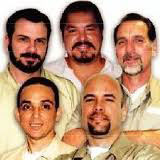
Top row left to right:
Fernando González,
Ramón Labañino
& René González
Bt. row left to right:
Antonio Guerrero &
Gerardo Hernández
WVN: And who are the Cuban Five? Explain what is going on with the Cuban Five, especially with the CIA agent who is being held in Cuba right now, as being held up by the so-called “democratic movements.”
AA: Okay, with the little time we have remaining, I will just basically tell your listeners the following: that the United States has been carrying out terrorist activities against Cuba since 1959 using what they call the “exiles.” There were over 3,500 Cubans killed in these activities and thousands more seriously injured since 1959. The Cuban government has time and again attempted to convince the American government to put a hold on these terrorists – mainly based in the Miami region. The U.S. refused to do so. As a result, Cuba had to do the following: they sent people to Miami – in this case, we are talking about the five Cubans – sent Cubans to Miami to monitor these terrorist groups in Miami. The purpose was to provide the information to Cuba, but also to provide this same information to the American authorities so they could take action against these terrorist organizations in the Miami region in order to stop the terrorist actions against Cuba. The Cuban Five gathered all that information, in terms of documents, videos and all that – crystal-clear proof – who and what they were doing in Miami to terrorize Cuba. It was brought to Havana – this information was collated by the Cuban government, prepared and actually a meeting took place in Havana with the FBI. The FBI was given all of this information. Well, something happened: they went back to the United States and, instead of arresting those terrorists in Miami who were planning all these events, they arrested the Cuban Five, who were trying to avoid and put an end to these terrorist activities. They’ve been in jail all this time, since 1998 – except one, who was just released a very short period ago: René. So this is the basic attitude the U.S. authorities have taken toward the Cuban Five – when they were arrested, they were kept in the hole, separated from the others for 17 months while the trial was being carried out. Why? They wanted to break them. They wanted to say, “Look, if you want to be free, if you want to see your family, if you want to go back home, you have to renounce Cuba. You have to say that you were spying for Cuba, etc.” However, they refused to, because the Cuban Five were not, and they are not, spies. They did not spy on any American civil or military installation; they were monitoring terrorist groups, which had nothing at all to do with spying. Yet, they were charged with conspiracy to spy. So, the Cuban Five are victims, as the Cuban people are victims, of this long-lasting attempt since 1959 by the United States to punish Cuba for standing up for its own system and standing up for its own sovereignty and for these same rights for the peoples of the world.
WVN: You know, I just want to say, also, with regard to their trial, which was held in Miami, the most ridiculous venue to have any justice for people who support the Cuban system there: the journalists from the Miami Herald, it was found out, were paid by the U.S. government to engage in slanted journalism about the Cuban Five during their trial. This is all part of the misinformation – which is why I wanted to do this series of shows on Cuba – the misinformation about Cuba, coming out of the U.S. press, regardless of what it is, there is nothing they can say that is good about Cuba, yet, amazingly, Latin America, as you lay it out in your book – Cuba and Its Neighbours: Democracy in Motion – are all looking up to Cuba. Yet, the United States is doing everything it can to undermine this system.
You know, when we speak about terrorism, I don’t think that the United States really has a leg to stand on when it comes to admonishing or going after so-called terrorists with the way it treats Cuba.
But, yeah, we just have a few more minutes left. If people were to travel to Cuba – we hope that they do – they can write to IFCO Pastors for Peace at cucaravan@igc.org. In July, they can find out how they can travel and have a rich and intimate experience with Cuba and its people. But what would people find if they went to Cuba now? What kind of welcome… what kind of flavour…? I mean, Cuba is rich with African heritage… What would it be like for them? What would they see in Cuba? How would they be greeted?
AA: Well, I think that, while there is a very sharp conflict between the American government and Cuban, the Cuban people have great love for the peoples of the U.S. They make a very sharp distinction between the two. I think, in order to prepare oneself before going to Cuba, or if someone is not able to go to Cuba but wants to find out more about it, it would be a very good idea to get a hold of a copy of my book for a briefing on the basic features of the political system in Cuba. It is easy to find it online; it’s at www.democracycuba.com. You can find out all about the book; you can also buy it online. I believe the paperback edition is available now for $22. For anyone about to go to Cuba, I believe, it will be helpful – it will help to lessen the culture shock – they will be prepared. For those people who are not able to travel there, I think that perhaps this book is one of the best ways to get a real flavour of what Cuba is all about, because I don’t only deal only with the political system as such – I deal with the society: the great debates that are going on now with regard to the need to change and improve the economic situation there, to improve the participatory nature of the Cuban political system. Cuba now is entirely different as it is portrayed. It is portrayed by the media as a “closed society,” whose people are “afraid to speak to each other,” as “homogeneous.” My book clearly shows that this is not the case. It is one of the most vibrant places where debate is taking place on the most important aspects of society.
WVN: You know, Arnold, I just want to jump in and say, you use the word “culture shock.” The culture shock that I found when I went to Cuba was how easygoing the people were. They were willing to talk about anything – usually they want to talk about politics or baseball – but they were completely open with criticizing the government. In fact, I just want to say also, I’ve read the communist party newspaper Granma and I was shocked when I got that newspaper. It was the only time I ever saw a government criticizing itself, saying, “We are responsible for this mistake we made. We are responsible.” You would never hear that coming out of, you know, the political system in the United States. But again, with regard to going to Cuba, the other thing that I remember is that you didn’t constantly have police and sirens and all this going on. That’s the kind of culture shock that I got. It was so peaceful, people were just going about their business, enjoying life; they were artists and painters, singing, dancing. And the other thing is – and I will give it back to you – is that I never saw healthier children in my life. And, mind you, I travelled wherever I wanted to go. There were no minders, no one following me around. I was free to travel wherever I wanted to go. So, it is an absolute lie that people cannot speak out there, if they want to truly dissent. In fact, that’s what their system is all about, is it not? With participatory democracy.
AA: Yes, I think it is. At the same time, I think one has to draw – if I may say – a line of distinction between, on the one hand, people who are saying, “We have to improve participation, we have to improve democracy, we have to improve the government.” There is a wide variety, a very wide horizon of people who are following this path, and I completely agree with that. And, on the other hand, there are those who I call – and I deal with this in detail in my book, if people are really curious, they should buy my book just for that – I deal with the so-called “left” dissidents. They are the most dangerous, in my view, and it goes all the way back to 1959 when the U.S. worked out its policy with regard to “left” dissidents. They say that “we are socialists” but we are “democratic socialists.” Their overall orientation is to oppose the constitutional order in Cuba. In other words, they coincide with the American policy of regime change. You have two different trends: you have people honestly discussing how to improve things, whether it is Raúl Castro himself, academics and others. Then you have the so-called “left” dissidents who, under the guise of being “socialist” or “leftist,” are really promoting regime change in Cuba by talking about a “democracy” that has to be “socialist” and has to be, of course, without the Castros. I think my book is the only one that deals with this topic frankly, honestly and by directly quoting the so-called “left” dissidents, who are the most dangerous for Cuba at this time.
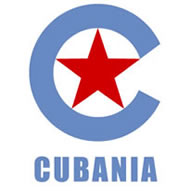 WVN: Right. And I want to end with just one historical note, and that is a quote by José Martí, because I believe he spoke about witnessing the U.S. system back in the late 1800s and then saying that Cuba needed its own system. Isn’t this where the term “Cubanía” arose? Talk about Martí and Cubanía.
WVN: Right. And I want to end with just one historical note, and that is a quote by José Martí, because I believe he spoke about witnessing the U.S. system back in the late 1800s and then saying that Cuba needed its own system. Isn’t this where the term “Cubanía” arose? Talk about Martí and Cubanía.
AA: That is a very complicated thing. I deal with that in my book as well. Other authors deal with that even more in depth than I do, and I quote them in my book. But Cubanía, basically, in my view, going back to my first and second books, comes from the 19th century, when the Cubans declared, under Spanish rule, “We have to put Cuban things on the agenda.” That’s when the war against Spanish occupation was taking place. The Cubans even elaborated four constitutions and established four constituent assemblies in the 19th century with a relatively modern way of looking at politics, the constitution and participation of the people.
WVN: A rich history of participatory democracy in Cuba and it continues to this day. We’ve been speaking with Arnold August, author of Cuba and Its Neighbour: Democracy in Motion. This is Reality News Radio with the IFCO Pastors for Peace. Arnold August, I want to thank you very much for spending the hour with us.
To go back to the Videos, Interviews and Photos page, Click Here.






